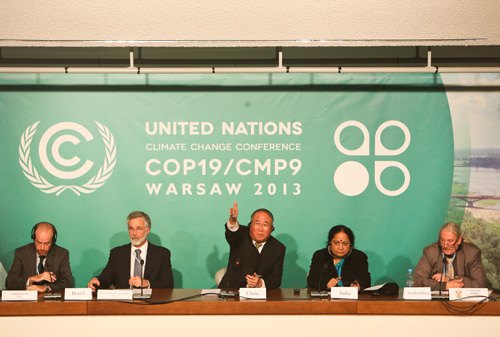|
 |
|
BASIC BRIEFING: Xie Zhenhua (center), head of the Chinese delegation at this year's UN climate conference, attends a news conference with representatives from other BASIC (China, Brazil, South Africa, and India) countries in Warsaw on November 20 (ZHANG FAN) |
'If not me, then who? If not now, then when? If not here, then where?" Su Wei, a lead Chinese climate negotiator, posted in a call to action on WeChat, a social networking media app.
Su is the deputy chief of the Chinese delegation to the 19th Conference of the Parties of the UN Framework Convention on Climate Change and Director General of Climate Change at the National Development and Reform Commission (NDRC). This year's conference ran from November 11-22 in Warsaw, Poland.
The conclusion that human activity is responsible for climate change has been further strengthened in the Fifth Assessment Report of the United Nations Intergovernmental Panel on Climate Change. The global impact of climate change has become increasingly prominent, posing perhaps the most severe challenge to the planet.
Though an overwhelming consensus has been reached in the international community that a warming planet will bring more natural disasters, debates over whether and how mankind should take action have never ceased.
At this year's conference, Japan said it plans to scale back its emission targets citing the aftermath of the 2011 earthquake and tsunami, which forced it to close 50 of its nuclear power plants. Australia, however, as a long-time dissenter in climate talks, is reportedly set to repeal the carbon tax and dismantle all climate institutions and initiatives.
Su said he was disappointed beyond words when the two countries made their announcements, crying out for countries to unite and work together for the sake of the environment.
Key agenda
Asking developed countries to honor their commitments to providing capital assistance and offering environmentally friendly technology transfer to developing countries remained a major point of dispute in this year's conference.
"Finance is key to the success of the Warsaw conference," agreed high-level officials of BASIC (China, Brazil, South Africa, and India) at a seminar held at the China Pavilion in Warsaw on November 20.
They urged developed countries to follow through with their obligations to provide $100 billion each year to developing countries in order to help fund their efforts to cope with issues related to climate change for the period from 2013 to 2020 in a measurable and verifiable manner.
Developed countries, while taking a moral high road in their climate rhetoric, are reluctant to provide assistance. The recent financial crisis has further hardened their resistance over the issue, warned Chinese experts.
Tod Stern, special envoy for climate change for the U.S. Government, said in terms of providing funding for developing countries, the United States would like to invite the private sector to join the initiatives. "It could be a loan, could be a loan guarantee, it could be risk insurance," said Stern in a press conference held in Washington, D.C. on November 9.
As a response, Xie Zhenhua, head of the Chinese delegation at this year's UN climate conference, insisted the funding come from the governments, or the public sector, instead of the private sector.
China in action
"Honestly, China is the biggest producer of greenhouse gases," admitted Xie. "There is no need to deny it."
China is deeply concerned about excess carbon emissions and climate change not because of external forces but because of its inner desire to create a clean and healthy environment, Xie said.
The toxic air and polluted water pose a major threat to people's health. The worst smog episodes witnessed in most parts of north China serve as a wake-up call for Chinese citizens and officials.
In a top-level decision made at the Third Plenary Session of the 18th Central Committee of Communist Part of China which closed on November 12, the Chinese Government vowed to keep a close eye on environmental protection matters and will make legislative efforts to monitor and control air, land and water pollution.
| 